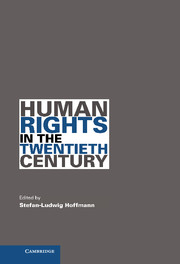Book contents
- Frontmatter
- Contents
- Notes on Contributors
- Acknowledgments
- Introduction: Genealogies of Human Rights
- Part I The Emergence of Human Rights Regimes
- Part II Postwar Universalism and Legal Theory
- Part III Human Rights, State Socialism, and Dissent
- 7 Embracing and Contesting
- 8 Soviet Rights-Talk in the Post-Stalin Era
- 9 Charter 77 and the Roma
- Part IV Genocide, Humanitarianism, and the Limits of Law
- Part V Human Rights, Sovereignty, and the Global Condition
- Index
- References
8 - Soviet Rights-Talk in the Post-Stalin Era
Published online by Cambridge University Press: 05 June 2012
- Frontmatter
- Contents
- Notes on Contributors
- Acknowledgments
- Introduction: Genealogies of Human Rights
- Part I The Emergence of Human Rights Regimes
- Part II Postwar Universalism and Legal Theory
- Part III Human Rights, State Socialism, and Dissent
- 7 Embracing and Contesting
- 8 Soviet Rights-Talk in the Post-Stalin Era
- 9 Charter 77 and the Roma
- Part IV Genocide, Humanitarianism, and the Limits of Law
- Part V Human Rights, Sovereignty, and the Global Condition
- Index
- References
Summary
Прав mom, у кого больше прав.
Right is he who has more rights.
Russian saying“The problem with Soviet legal history,” my teacher Martin Malia once quipped, “is that there’s not enough of it.” The remark was meant to register the pervasiveness, among elites and masses alike, of extra-legal ways of doings things, the apparent irrelevance of Soviet law to Soviet practices, and the particular Bolshevik contempt (sanctioned by Marx, Lenin, and others) for the “bourgeois” notion of the rule of law. Soviet law, in this widely shared view, functioned primarily as a façade for domestic and foreign spectators, behind which the real mechanisms of power operated. Implicit in this approach is an assumption of bad faith: that laws, or at least some laws, were not meant to be actionable and instead served a purely ideological function. It is a critique whose pedigree reaches back at least to Max Weber’s attack on the “pseudo-constitutionalism” of tsarist Russia following the revolution of 1905.
It should perhaps come as no surprise that the Soviet critique of “bourgeois” legal systems exactly mirrored this view. In capitalist societies, so the argument runs, law serves as an “illusion” behind which economically determined relationships of exploitation freely operate. “Fictions” was one of the favored terms used by Lenin – and therefore by legions of later Soviet scholars – to describe bourgeois constitutions: “A constitution is fictitious when law and reality diverge; it is not fictitious when they coincide.” Of course, regardless of time and place, pays légal and pays réel rarely coincide. It is more productive to think of laws as norms than as descriptions of reality, more fruitful to focus on the tension between law in theory and law in practice. My point is not to belittle Lenin’s (or Malia’s) observation, but rather to caution against a dismissive literalism when thinking about the functions and purposes of law under Soviet socialism.
- Type
- Chapter
- Information
- Human Rights in the Twentieth Century , pp. 166 - 190Publisher: Cambridge University PressPrint publication year: 2010
References
- 16
- Cited by



